Ethics Beyond Compliance:
The Challenge For Attorneys
If there is one certainty today it is that boundaries between personal and professional life have become fundamentally blurred; and the values that inform one realm can have a profound impact on the other. A challenge all attorneys face is discovering a way to manage more effectively their personal responsibilities, business decisions and professional conduct in this complex environment.
Given the frequency of legislative and regulatory compliance issues, real and potential conflicts of interest as well as renewed public debate and policy concerns, most firms, like other professional entities, are revisiting the necessity for ethical reflection and responsible decision-making. They have come to understand that simply publishing rules of conduct, ethics codes and regulatory policies does not assure the quality of deliberation required if individual practitioners and firms are to make good long-range decisions.
What many attorneys assume is that following the rules should un-problematically resolve most dilemmas they face in daily practice. What this assumption fails to recognize is that codes, and even unambiguous rules of conduct, are only a baseline, guidelines for action that must be weighed very carefully in view of those circumstances where they are applied. In other words, mere compliance is never sufficient in itself; it cannot excuse one from exercising the rational deliberation required of any responsible judgment. In fact, an exclusive focus on codes has even been used as a tool of fraud, manipulation and coercion, as we observe in making the common distinction between following the 'letter' vs. the 'spirit' of the law.
Always the responsibility falls back upon us to decide how to interpret various codes to which we do and want to adhere, how and in what manner to apply them, and when doing the 'right' thing requires going beyond 'mere compliance' and acting courageously on a foundation of sound judgment.
Too often we replace personal responsibility and integrity with 'rationalization', 'doing what is required' and other modes of destructive behavior. To find an ethical path, to effect real progress in the responsible exercise of personal, business and professional decision-making, we need to rediscover the genuine role of rationality, respect and human understanding.


